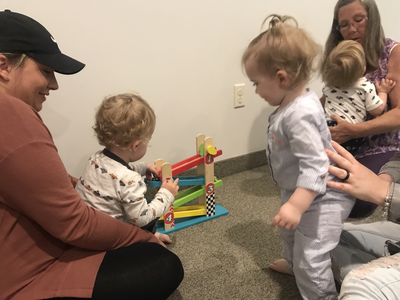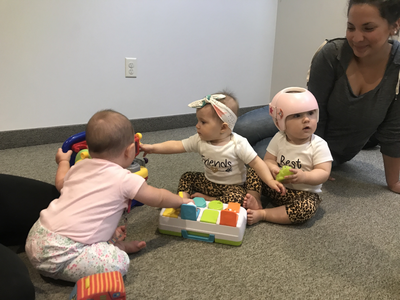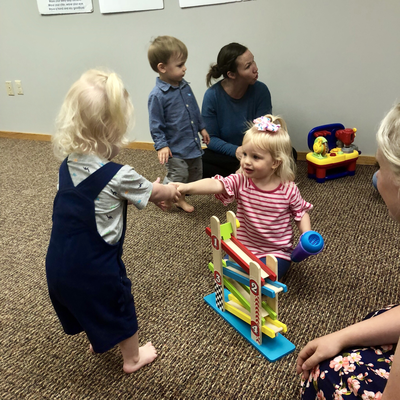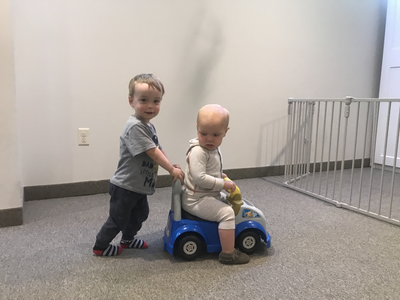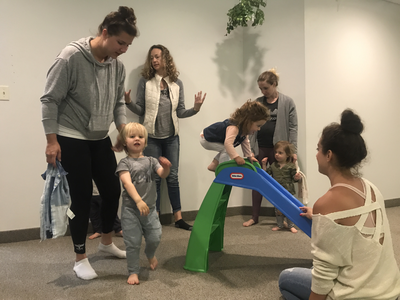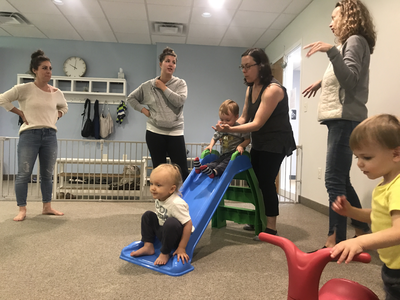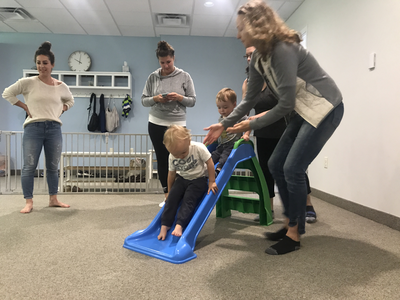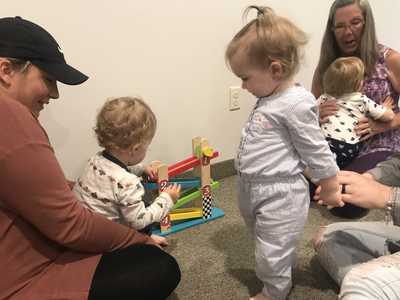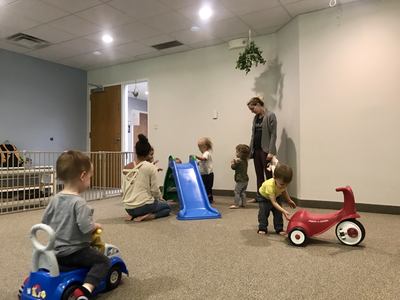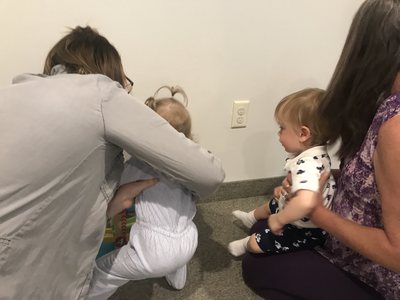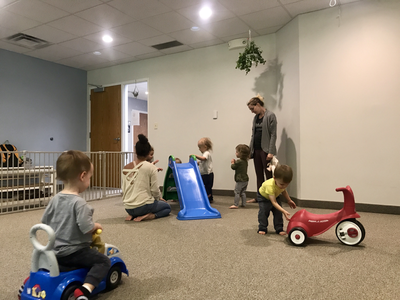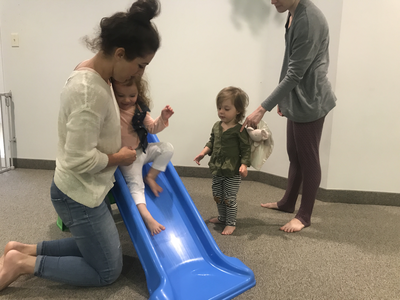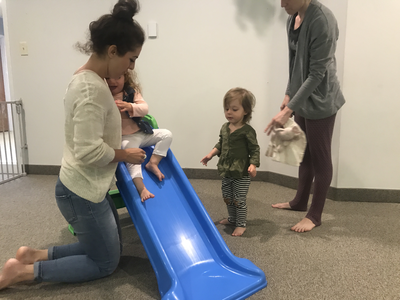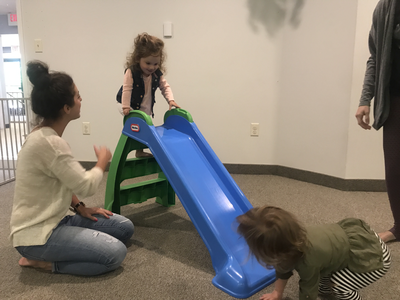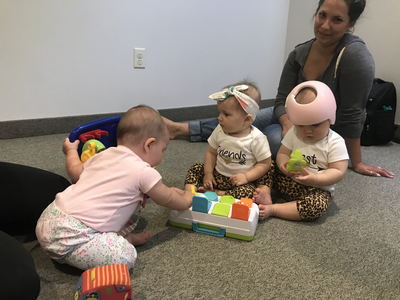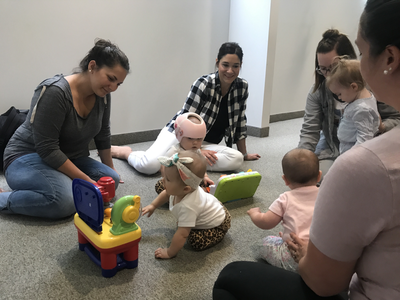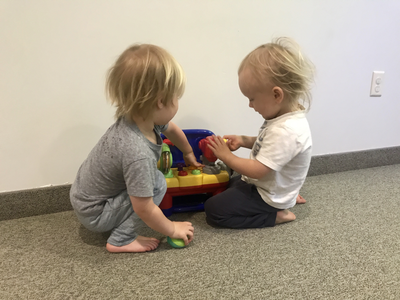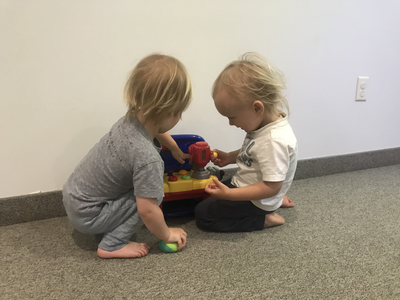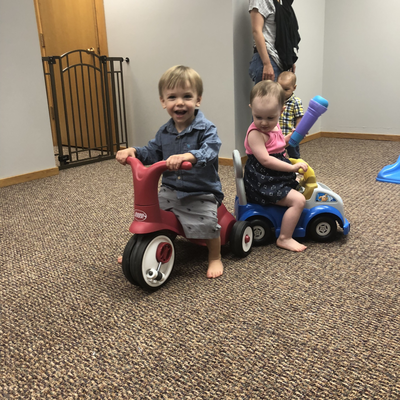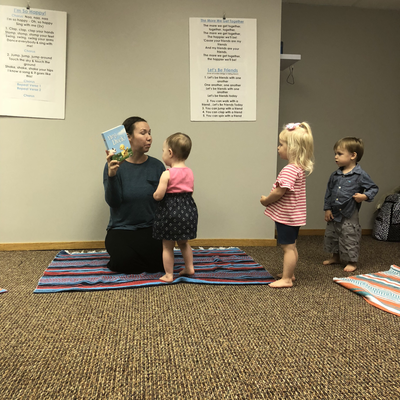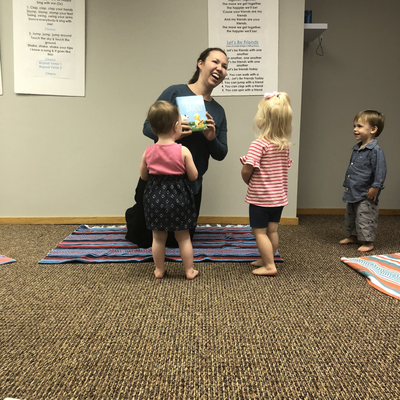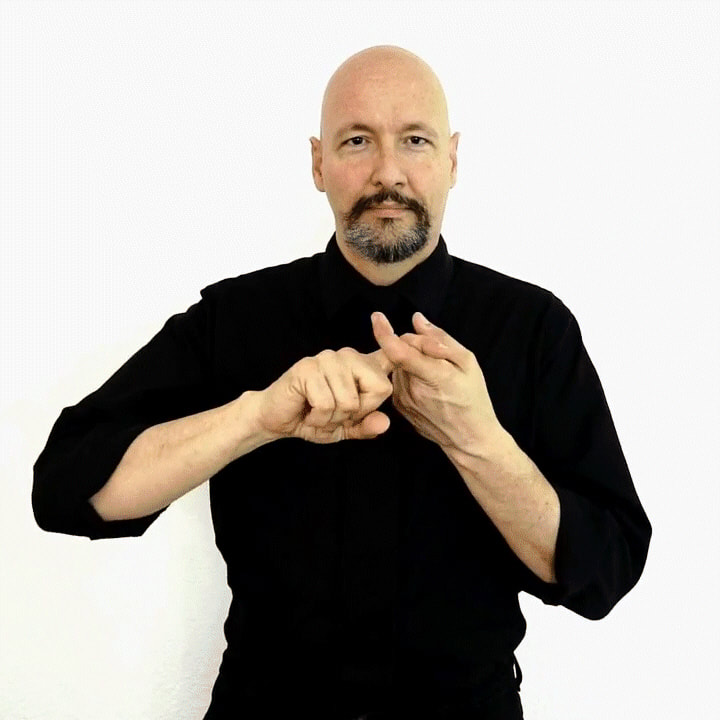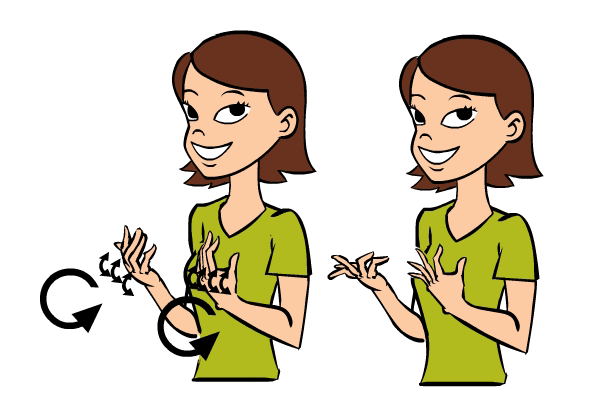Fun foundations class: friendship (turn taking)
June 4 - June 8, 2018
Social Skills in Toddlers: Sharing + Turn Taking
I don't think I've visited a playground, indoor play area or Square Play-type space without hearing "share that toy with your friend!" It's a struggle and the struggle is real, people.
I often see this situation play out like this:
Child A: playing with train
Child B: comes up and shows interest in that awesome train
Child A's mom: "Hey Jimmy, can you share the toy with your friend? Be a good friend!" Mom forcibly removes toy from her child's now-screaming-and-flailing hands to give to friend.
Ok. This is so sad to me! Have I done this?? YES! Have we all done this?? PROBABLY! Sheesh. The other struggle is the one where we are trying to figure out how to be good mom friends to other moms. What a mind eff that is, right!? I had no idea that taking my child to the playground would involve so much anxiety in just how I think the other mom is judging my parenting skills!!!
Anyhow. I digress.
After many years of nannying, working in Montessori preschools, and now actively teaching social skills as a speech pathologist, here's my take:
1. Out here in the real world, I do not have to give up my prized possession just because a friend (or stranger!) looks like they want it. I mean...that's just bonkers.
2. "Sharing." What an ambiguous word. Most things cannot be "shared" in the sense that 2 people can use them at the same time. Somethings can be divided (food, playdoh, etc.). Some things can be used at the same time, provided the item is large enough (sensory bins, water tables, etc.). MOST THINGS require taking turns. For this reason, I do not use the word "share" in our household vocabulary, nor do I in therapy settings. We talk about taking turns. Taking turns inherently implies that each person gets time with the item, and so it feels more fair and less anxiety-ridden to children. "Once Suzie takes a turn with the toy, I get a turn. I can deal with that."
3. As with all behavior sculpting, USE A SCRIPT. Say the same words or nearly the same words EVERY TIME you are in a similar situation. I mean, I love exposing children to big vocabulary and lots of language, but this just isn't the time. When you say the same thing every time, your child comes to expect the same results every time. Here's some sample scripts in case you need a starting point - remember to keep your language simple and clear.
4. If your child is struggling with the waiting, try:
5. If turn taking feels especially challenging, practice turn taking at home with your child. If your child can learn to share with you, they will be better at sharing with peers. Also, it is easier to control the environment at home with your own child than to control the environment when your child is playing with a sibling or friend, so you're setting yourself up for success a bit more. The main goal is to teach our children that when they take turns, they DO get the toy back! Taking a turn does not mean you lose the item forever! Here's how it can look:
A few tips for helping playdates go a bit more smoothly:
I don't think I've visited a playground, indoor play area or Square Play-type space without hearing "share that toy with your friend!" It's a struggle and the struggle is real, people.
I often see this situation play out like this:
Child A: playing with train
Child B: comes up and shows interest in that awesome train
Child A's mom: "Hey Jimmy, can you share the toy with your friend? Be a good friend!" Mom forcibly removes toy from her child's now-screaming-and-flailing hands to give to friend.
Ok. This is so sad to me! Have I done this?? YES! Have we all done this?? PROBABLY! Sheesh. The other struggle is the one where we are trying to figure out how to be good mom friends to other moms. What a mind eff that is, right!? I had no idea that taking my child to the playground would involve so much anxiety in just how I think the other mom is judging my parenting skills!!!
Anyhow. I digress.
After many years of nannying, working in Montessori preschools, and now actively teaching social skills as a speech pathologist, here's my take:
1. Out here in the real world, I do not have to give up my prized possession just because a friend (or stranger!) looks like they want it. I mean...that's just bonkers.
- If I am reading at the park and a person sits down nearby and says, "Oh, I've been dying to read that book!", the social expectation is NOT that I just give it to her....right? And yet isn't that what Child A's mom expected in the train scenario?
- A stranger looks longingly at my coffee - and I grip it TIGHTER. DO NOT TAKE MY COFFEE, LADY! GET YOUR OWN!
- I am using the library's public computers and a person needs a computer. Well, they have to wait their turn....right?!??!?
2. "Sharing." What an ambiguous word. Most things cannot be "shared" in the sense that 2 people can use them at the same time. Somethings can be divided (food, playdoh, etc.). Some things can be used at the same time, provided the item is large enough (sensory bins, water tables, etc.). MOST THINGS require taking turns. For this reason, I do not use the word "share" in our household vocabulary, nor do I in therapy settings. We talk about taking turns. Taking turns inherently implies that each person gets time with the item, and so it feels more fair and less anxiety-ridden to children. "Once Suzie takes a turn with the toy, I get a turn. I can deal with that."
3. As with all behavior sculpting, USE A SCRIPT. Say the same words or nearly the same words EVERY TIME you are in a similar situation. I mean, I love exposing children to big vocabulary and lots of language, but this just isn't the time. When you say the same thing every time, your child comes to expect the same results every time. Here's some sample scripts in case you need a starting point - remember to keep your language simple and clear.
- "Billy is taking a turn. When he's done with his turn, you may have a turn."
- "First Billy's turn, then your turn."
- "Right now it is Billy's turn. We will wait until he's done, then you can have a turn.
4. If your child is struggling with the waiting, try:
- Be empathetic and label the emotion. We know that by using the "Name it to tame it" strategy, kids (and adults) can learn to process emotions even better! Example: "It can be so hard to wait sometimes! I'm sorry you're feeling sad!"
- Suggest a different (available) toy they could play with while waiting.
5. If turn taking feels especially challenging, practice turn taking at home with your child. If your child can learn to share with you, they will be better at sharing with peers. Also, it is easier to control the environment at home with your own child than to control the environment when your child is playing with a sibling or friend, so you're setting yourself up for success a bit more. The main goal is to teach our children that when they take turns, they DO get the toy back! Taking a turn does not mean you lose the item forever! Here's how it can look:
- when your child is playing with a preferred toy, sit down with them on the floor.
- give them warnings that it will soon be your toy:
- "In 1 minute, it will be my turn." then -
- "I'm going to countdown from 10 and when I get to 0, it will be my turn."
- when you get to 0, say "ok, it is my turn now. Please give me the toy." Remember - do not phrase this as a question! You can be polite, but you need to be clear about your expectation.
- if your child is unable to hand you the item (SO COMMON in the beginning stages), you will have to forcibly take the item away.
- "when I'm done with my turn, it will be your turn."
- play with the item for 15 seconds in a real, meaningful way (if it is a truck, roll it back and forth - if it is a doll, feed it, rock it, burp it - etc.)
- "now it's your turn with the truck/doll/whatever! Yay! Great job waiting! I love how you're taking turns!!" Clap for them and rub their back - let them know they did a great job!
- give them a relatively long turn - 2-3 minutes.
- start the process all over again - try to get 4+ cycles of this in, several times per day - but don't push your child over the edge!
A few tips for helping playdates go a bit more smoothly:
- offer a choice: “Would you like to share your red car or your blue car?”
- Talk about playdates ahead of time. But then put special possessions away. Identify items your child is comfortable sharing.
- Plan activities for two. A bucket of dinky cars, a sandbox with lots of shovels and sifters or a mound of playdough means there’s enough for both players.
skills + strategies discussed in class
Signs about friendship
Songs from friendship class
|
|
Spin Around Time!
1. Clap your hands, clap your hands, clap them to the beat! Clap your hands to the beat, Now spin around in circles! 2. Stomp your feet, stomp your feet, stomp them to the beat! Stomp your feet to the beat Now spin around in circles! 3. Raise your hands, Raise your hands, Raise them in the air Raise your hands in the air, now spin around in circles! 4. Shake your body, shake your body, shake it to the beat! Shake your body to the beat, Now spin around in circles! |
|
|
Shake Our Sillies Out
We're gonna shake, shake, shake our sillies out, Shake, shake, shake our sillies out, Shake, shake, shake our sillies out, And wiggle our waggles away. 2. Clap our crazies out 3. Jump our jiggles out 4. Jog our jitters out 5. Stretch our stretchies out 6. Yawn our yawnies out Repeat all |
|
|
I’m So Happy!
Chorus: Naa, naa, naa I'm so happy - Oh, so happy Sing with me (2x) 1. Clap, clap, clap your hands Stomp, stomp, stomp your feet Swing, swing, swing your arms Dance everybody & sing with me! Chorus 2. Jump, jump, jump around Touch the sky & touch the ground Shake, shake, shake your hips I know a song & it goes like this! Chorus Repeat Verse 1 Repeat Verse 2 Chorus |
|
Taking Turns Song
(Tune of Frere Jacques/Are You Sleeping) Now it’s your turn Now it’s your turn We take turns We take turns First it’s your turn Then it’s his/her turn We take turns We take turns OR Now it’s his/her turn… Now it’s his/her turn… We take turns We take turns First it’s his/her turn Then it’s your turn We take turns We take turns |
Let’s Be Friends
(Tune of London Bridge is Falling Down)
1. Let’s be friends with one another
One another, one another
Let’s be friends with one another
Let’s be friends today
2. You can walk with a friend…Let’s Be Friends Today
3. You can jump with a friend
4. You can clap with a friend
5. You can spin with a friend
(Tune of London Bridge is Falling Down)
1. Let’s be friends with one another
One another, one another
Let’s be friends with one another
Let’s be friends today
2. You can walk with a friend…Let’s Be Friends Today
3. You can jump with a friend
4. You can clap with a friend
5. You can spin with a friend
|
|
The More We Get Together
The more we get together, together, together, The more we get together, The happier we'll be! 'Cause your friends are my friends And my friends are your friends. The more we get together, the happier we'll be! |
BOokS FOR TALKING ABOUT friendship
|
Hey Duck! is the book we read in class. This is one of our house's favorites and it's such a fun one for doing different voices. I love that it gives the opportunity to explain some idioms and figurative language as well!
|
|
|
Another book for discussing about the importance of turn taking. This one is really great for explaining how and why we share, take turns, divide, trade, etc.
|
|

